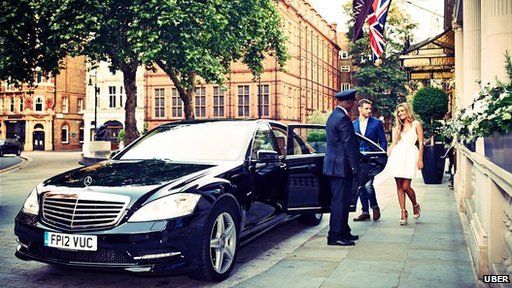Uber app taxi row referred to London's High Court
- Published

London's transport authority has announced it does not believe Uber's car service is breaking the law by using an app to determine charges.
However, Transport for London added it would invite the High Court to give a binding ruling on the matter "given the level of concern among the trade".
The Licensed Taxi Drivers Association (LTDA) has claimed the app equates to being a taximeter, which private vehicles are not allowed to use.
It plans a demonstration on 11 June.
The organisation announced the action earlier this month, saying it intended to cause "severe congestion and traffic chaos for large parts of central London".
It confirmed that TfL's announcement would not change its plans.
High Court ruling
The controversy centres on an app provided to Uber's drivers - which is separate from the one used by the public - that calculates the journey distance and time taken, and then relays this information to remote computer servers to determine the fee.
TfL's decision is based on the fact that Uber's kit does not require a physical connection between the device and the vehicle, as is the case with the equipment used by black cabs.
However, it added that "the rapid pace at which smartphone-based technology has been developing in recent years" meant the matter should be referred to a judge.
"We will be asking the High Court to provide a binding ruling," added Leon Daniels, TfL's managing director of surface transport.
"This is the sensible approach, and we hope that London's taxi drivers and private hire drivers and operators will work with us to bring clarity on this issue."
However, LTDA is in no mood to co-operate, and highlights the fact that the handsets Uber provides to drivers are blocked from making calls.
"The taxi trade have no confidence in TfL and its legal team whatsoever and we will be issuing proceedings of our own," its general secretary Steve McNamara told the BBC.
"This attitude demonstrates why we are being forced to demonstrate. TfL is simply not fit for purpose."
However, Uber's London manager proved more receptive.
"We very much welcome TfL's announcement today bringing clarity and confirming that TfL and Uber fully share the vision that technology should be a key driver in changing the way people are moving around their city, improving the experience for both riders as well as drivers," said Jo Bertram.
Driverless Uber
San Francisco-based Uber describes itself as a "pick-up" service that connects those needing a ride with a background-checked private driver. It then takes a cut - typically 20% - of the fee.
It now operates in more than 100 cities across 30 countries. In the UK it covers London and Manchester, but has plans to expand to a further four or five cities over the next year.
The firm highlights both the safety features offered to customers - letting them see the name and photo of the driver before they arrive - as well as offering the drivers themselves the flexibility to set their own hours and the area where they want to work.
However, comments by the firm's chief executive on Wednesday may give some potential recruits reason to pause.
Travis Kalanick told an audience in California the firm's long-term plan was to replace drivers with self-controlled cars.
His comments followed Google's announcement that it would start building its own self-drive vehicles - the search giant is one of Uber's investors.
"Look, this is the way the world is going," Mr Kalanick said, when questioned about how he would explain this to the workers.
"If Uber doesn't go there, it's not going to exist either way... the world isn't always great."
He later tweeted that he thought the move would take a couple of decades to achieve.
But the timing of his comments offers the LTDA another way to attack a firm it has already described as an "American monster".
"Its drivers can work very flexibly, they can stay at home all day if they work for Uber - they'll be unemployed," said Mr McNamara.
"I think driverless cars is still very much a Star Wars technology. While it may work in some cities in the distant future, I cannot see it working in a city like London with the complex layout of its streets."
- Published28 May 2014
- Published22 May 2014
- Published8 May 2014